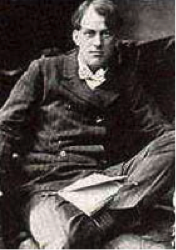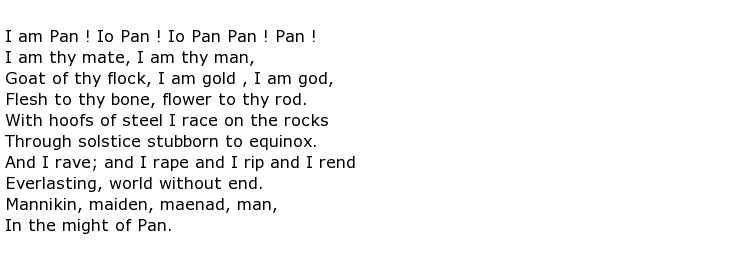 Here is a most unusual man – a poet who was heavily involved in the occult and mysticism. He also found time to be a ceremonial magician and an occasional mountaineer but his major project was to be the founding member of a new religious philosophy which he called Thelema. As this developed Crowley saw himself in the role of prophet and it was his responsibility to inform the whole of humanity of the dawn of the Aeon of Horus.
Here is a most unusual man – a poet who was heavily involved in the occult and mysticism. He also found time to be a ceremonial magician and an occasional mountaineer but his major project was to be the founding member of a new religious philosophy which he called Thelema. As this developed Crowley saw himself in the role of prophet and it was his responsibility to inform the whole of humanity of the dawn of the Aeon of Horus.
It was perhaps inevitable that religion would play such a key role, at least in his early life, having been born into a household where the parents, who were upper class and very well off, were part of a faction of the Plymouth Brethren known as the Exclusive Brethren. Born in Warwickshire, England in 1875 he was christened Edward Alexander Crowley. Aleister’s young life consisted of daily bible readings and a limited circle of friends, all of who had to be of the same faith as him. The death of his father when the boy was 12 years old had such a profound effect on him that he turned away from conventional religion from then on.
His mother struggled so much to keep him in check because of his unruly behaviour which was so bad that she called him “The Beast”. Crowley never forgot that and, in later life, was happy to use that nickname when referring to himself. His behaviour was seen by many as wicked – his bisexuality was a good example – but his attitude was ‘do as thou wilt’ and he refused to forsake those pleasures of life that many regarded as sinful.
As a young man he joined the esoteric Hermetic Order of the Golden Dawn and was so deeply involved in this way of life that he eventually formed his own religious commune in the small Sicilian town of Cefalù. It was called the Abbey of Thelema and his tenure as leader of this commune attracted much controversy during the period 1920-23. He eventually gave up on the Abbey, returning to England but he continued his involvement with the philosophical ways of Thelema for the rest of his life.
As a writer he was prolific, producing a great deal of work on the occult and ceremonial magic. He often said that it was not he who was writing them, but some other world being acting on his behalf. Plays, fictional novels and poetry also flowed from his pen. Probably his most famous poem was Hymn to Pan. A powerful piece, quite clearly dedicated to the pleasures of the flesh, here is a brief extract from it:

Aleister Crowley died in 1947 at the age of 72 in Hastings of a respiratory infection but he was, by then, a heroin addict. Mysteriously the doctor who had been treating him died shortly after. It was said that Crowley had put a curse on him for refusing to continue prescribing drugs to him. In keeping with the life that had gone before, his cremation service was described as a ‘Black Mass’ with

